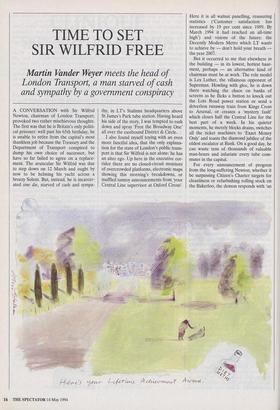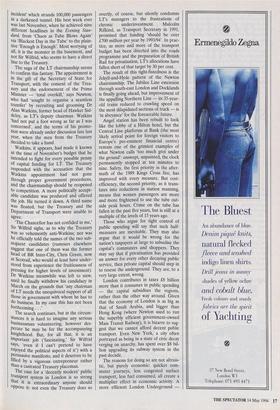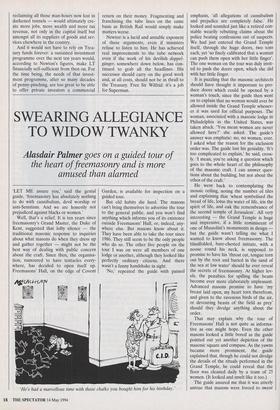TIME TO SET SIR WILFRID FREE
Martin Vander Weyer meets the head of
London Transport, a man starved of cash and sympathy by a government conspiracy
A CONVERSATION with Sir Wilfrid Newton, chairman of London Transport, provoked two rather mischievous thoughts. The first was that he is Britain's only politi- cal prisoner: well past his 65th birthday, he is unable to retire from the capital's most thankless job because the Treasury and the Department of Transport conspired to dump his own choice of successor, but have so far failed to agree on a replace- ment. The avuncular Sir Wilfrid was due to step down on 12 March and ought by now to be helming his yacht across a breezy Solent. But, instead, he is incarcer- ated sine die, starved of cash and sympa- thy, in LT's Stalinist headquarters above St James's Park tube station. Having heard his side of the story, I was tempted to rush down and spray 'Free the Broadway One' all over the eastbound District & Circle.
I also found myself toying with an even more fanciful idea, that the only explana- tion for the state of London's public trans- port is that Sir Wilfrid is not alone: he has an alter ego. Up here in the executive cor- ridor there are no closed-circuit monitors of overcrowded platforms, electronic maps showing this morning's breakdowns, or muffled tannoy announcements from 'your Central Line supervisor at Oxford Circus'. Here it is all walnut panelling, reassuring statistics (`Customer satisfaction has increased by 19 per cent since 1989. By March 1994 it had reached an all-time high') and visions of the future: the Decently Modern Metro which LT wants to achieve by — don't hold your breath the year 2007.
But it occurred to me that elsewhere in the building — in its lowest, hottest base- ment, perhaps — an alternative kind of chairman must be at work. The role model is Lex Luther, the villainous opponent of Superman. Howling with glee, he is down there watching the chaos on banks of screens as he flicks a button to knock out the Lots Road power station or send a driverless runaway train from Kings Cross to Arsenal, or creates a 'mystery fault' which closes half the Central Line for the best part of a week. In his quieter moments, he merely blocks drains, switches all the ticket machines to 'Exact Money Only' and toasts the diamond jubilee of the oldest escalator at Bank. On a good day, he can waste tens of thousands of valuable man-hours and infuriate every tube com- muter in the capital.
For every announcement of progress from the long-suffering Newton, whether it be surpassing Citizen's Charter targets for cleanliness or refurbishing rolling stock on the Bakerloo, the demon responds with 'an incident' which strands 100,000 passengers in a darkened tunnel. His best week ever was last November, when he achieved nine different headlines in the Evening Stan- dard, from 'Chaos as Tube Blows Again' via 'Blackest Day in the Tube' to the plain- tive 'Enough is Enough'. Most worrying of all, it is the monster in the basement, and not Sir Wilfrid, who seems to have a direct line to the Treasury.
The saga of the LT chairmanship seems to confirm this fantasy. The appointment is in the gift of the Secretary of State for Transport, with the consent of the Trea- sury and the endorsement of the Prime Minister — 'total overkill,' says Newton, who had 'sought to organise a seamless transfer' by recruiting and grooming Dr Alan Watkins, former head of Hawker Sid- deley, as LT's deputy chairman. Watkins had not put a foot wrong as far as I was concerned', and the terms of his promo- tion were already under discussion late last year, when the men from the Treasury decided to take a hand.
Watkins, it appears, had made it known at the time of November's budget that he intended to fight for every possible penny of capital funding for LT. The Treasury responded with the accusation that the Watkins appointment had not gone through proper government procedures, and the chairmanship should be reopened to competition. A more politically accept- able candidate was produced and offered the job. He turned it down. A third name was floated, but the Treasury and the Department of Transport were unable to agree.
`The Chancellor has not confided in me,' Sir Wilfrid sighs, as to why the Treasury was so vehemently anti-Watkins; nor was he officially told the names of the two sub- sequent candidates (rumours elsewhere suggest that one of them was the former head of BR Inter-City, Chris Green, now at Scotrail, who would at least have under- stood from experience the fruitlessness of pressing for higher levels of investment). Dr Watkins meanwhile was left to stew, until he finally withdrew his candidacy in March on the grounds that 'any chairman of LT needs the unequivocal support of all those in government with whom he has to do business. In my case this has not been forthcoming . . The search continues, but in the circum- stances it is hard to imagine any serious businessman volunteering, however des- perate he may be for the accompanying knighthood. But, for all that, it is an important job (`fascinating,' Sir Wilfrid saYs, 'even if I can't pretend to have enjoyed the political aspects of it') with a Persuasive manifesto, and it deserves to be filled by a vigorous entrepreneur rather than a castrated Treasury placeman. The case for a 'decently modern' public transport system in London is so strong that it is extraordinary anyone should oppose it: not even the Treasury does so overtly, of course, but silently condemns LT's managers to the frustrations of chronic underinvestment. Malcolm Rifkind, as Transport Secretary in 1991, promised that funding 'should be over £700 million per year by 1993/94'. In prac- tice, as more and more of the transport budget has been diverted into the roads programme and the preparation of British Rail for privatisation, LT's allocations have fallen short of that target by 30 per cent.
The result of this tight-fistedness is the Jekyll-and-Hyde pattern of the Newton chairmanship. The Jubilee Line extension through south-east London and Docklands is finally going ahead, but improvement of the appalling Northern Line — its 35-year- old trains reduced to crawling speed on the most dilapidated sections of track — is `in abeyance' for the foreseeable future.
Angel station has been rebuilt to look like the lobby of a Hilton hotel, but the Central Line platforms at Bank (the most likely arrival point for foreign visitors to Europe's pre-eminent financial centre) remain one of the grimiest examples of what Newton calls 'too much grot under the ground': unswept, unpainted, the clock permanently stopped at ten minutes to nine. Safety, the first priority in the after- math of the 1989 Kings Cross fire, has improved with every measure. But cost- efficiency, the second priority, as it trans- lates into reductions in station manning, means that women passengers are more and more frightened to use the tube out- side peak hours. Crime on the tube has fallen in the past five years, but is still at a multiple of the levels of 15 years ago. Those who argue for tight control of public spending will say that such half- measures are inevitable. They may also argue that it would be wrong for the nation's taxpayers at large to subsidise the capital's commuters and shoppers. They may say that if privatisation has provided an answer for every other decaying public service, then private capital should step in to rescue the underground. They are, to a very large extent, wrong. London contributes in taxes £8 billion more than it consumes in public spending — the capital subsidises the regions, rather than the other way around. Given that the economy of London is as big as that of Saudi Arabia, and bigger than Hong Kong (where Newton used to run the superbly efficient government-owned Mass Transit Railway), it is bizarre to sug- gest that we cannot afford decent public transport. Even New York, a city often portrayed as being in a state of civic decay verging on anarchy, has spent over $8 bil- lion upgrading its subway system in the past decade.
The reasons for doing so are not altruis- tic, but purely economic: quicker com- muter journeys, less congested surface transport, less fuel consumed, all create a multiplier effect in economic activity. A more efficient London Underground — reclaiming all those man-hours now lost in darkened tunnels — would ultimately cre- ate more jobs, more wealth and more tax revenue, not only in the capital itself but amongst all its suppliers of goods and ser- vices elsewhere in the country.
And it would not have to rely on Trea- sury funds forever: a sustained investment programme over the next ten years would, according to Newton's figures, make LT financially self-sufficient from then on. For the time being, the needs of that invest- ment programme, after so many decades of penny-pinching, are too great to be able to offer private investors a commercial return on their money. Fragmenting and franchising the tube lines on the same basis as British Rail would simply make matters worse.
Newton is a lucid and amiable exponent of these arguments, even if ministers refuse to listen to him. He has achieved real improvements to the tube network even if the work of his devilish doppel- ganger, somewhere down below, has con- tinued to grab all the headlines. His successor should carry on the good work and, at all costs, should not be in thrall to the Treasury. Free Sir Wilfrid: it's a job for Superman.




























































 Previous page
Previous page